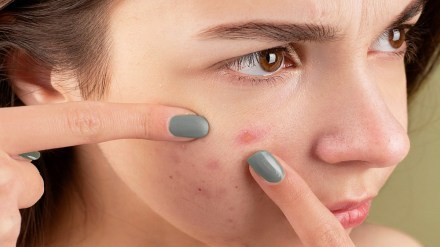Acne is often thought of as a teenage issue, but many adults continue to struggle with breakouts well into their 20s, 30s, and beyond. In fact, adult acne is becoming increasingly common, affecting both men and women. As a dermatologist, Dr Neha Sharma, dermatologist, founder of Estique Skin & Hair Clinic, Gurugram regularly sees patients who are frustrated by the persistence of acne well into their 40s and the impact it has on their confidence.
Why Does Adult Acne Happen?
According to Dr. Sharma, while adult acne shares some similarities with teenage acne, it can have different underlying causes.
Here are some of the most common factors:
Hormonal Fluctuations: Hormones play a significant role in acne development, and fluctuations in hormones—particularly androgens can trigger acne breakouts. For women, this often occurs around menstruation, pregnancy, or menopause, or due to conditions like polycystic ovarian syndrome (PCOS). Oral contraceptives can also trigger acne in some cases.
Stress: Stress triggers the body to produce more cortisol, a hormone that triggers sebaceous glands to produce more oil in the skin. This excess oil can clog pores and lead to acne breakouts.
Skin-Care and Makeup Products: Not all skin-care products are created equal. If you have adult acne, you should read the labels on your skin care and hair care products. Make sure that you see one of the following terms on every container:
- Non-comedogenic
- Non-acnegenic
- Oil-free
- Won’t clog pores.
According to Dr. Sharma, using products that are not non-comedogenic (designed not to block pores) can lead to clogged pores and acne. Similarly, makeup products with oils or irritating chemicals can trigger breakouts, especially in sensitive skin.
Diet: A lot of studies suggest that high-glycemic foods and dairy products contribute to acne development in some individuals. Diets rich in sugar and processed carbohydrates can lead to increased insulin levels, which also exacerbates acne.
Medication: Acne is a side effect of some medicines. If you suspect that a medicine is triggering your acne or making it worse, talk with the doctor who prescribed it. Certain medications, such as corticosteroids, antidepressants, and birth control pills, can contribute to adult acne.
Genetics: If your parents or close relatives had adult acne, you might be more prone to experiencing it yourself. Genetics can influence the size of your sebaceous glands and how your skin responds to bacteria and inflammation.
Environmental Factors: Pollution, humidity, and exposure to harsh chemicals can irritate the skin, clog pores, and increase the risk of acne.
How to Treat Adult Acne?
Treating adult acne often requires a tailored approach, as what works for one person may not work for another. Dr. Sharma explained that first step in management is figuring out the cause of Adult Acne. “This requires a detailed evaluation of hormones, lifestyle, diet, medication history. Work up to deal with the cause is the key to controlling adult acne,” she told Financial Express.com.
The following strategies are effective for most patients:
Topical Treatments
- Retinoids: Retinoids (such as tretinoin) are vitamin A derivatives that help to unclog pores, reduce inflammation, and promote skin cell turnover. They are a cornerstone of acne treatment.
- Benzoyl Peroxide: This antimicrobial agent reduces bacteria on the skin and decreases inflammation, making it a great option for spot treatment or use in cleansers.
- Salicylic Acid: This beta-hydroxy acid helps exfoliate the skin and clear clogged pores. It’s often found in over-the-counter cleansers and toners.
- Azelaic Acid: Azelaic acid is useful for reducing inflammation and killing acne-causing bacteria. It’s also helpful for those dealing with hyperpigmentation from acne scars.
Not all skin types can tolerate all products so please consult with your dermatologist to form a skin care regime, she emphasised.
Oral Medications
Oral medications are not the first line of management. We often resort to them if lifestyle modifications and topical therapies are not working.
Antibiotics: For cases of moderate to severe acne, oral antibiotics may be prescribed to reduce inflammation and kill bacteria. However, they are usually used for short periods due to concerns about resistance.
Hormonal Therapies: For women, oral contraceptives or spironolactone (which blocks androgen production) can be effective in controlling hormonally-driven acne.
Isotretinoin: For severe cases of adult acne that do not respond to other treatments, isotretinoin (Accutane) may be prescribed. It’s a powerful medication that significantly reduces oil production, but it requires close medical supervision due to potential side effects.
Lifestyle and Skincare Adjustments
This forms the most important part of management of Adult Acne. As mentioned earlier, we need to work on diet ,sleep, hormones, stress management , and skin care regime to reduce breakouts and flare ups
Professional Treatments
Chemical Peels: Chemical peels using glycolic acid, salicylic acid, or other exfoliating agents can help clear acne, reduce pigmentation, and improve skin texture.
Laser and Light Therapy: Therapies like blue light and laser treatments target acne-causing bacteria and inflammation. These are often used in conjunction with other treatments.
How to manage acne scars?
For many adults, acne scarring is a major concern. Treatments like radiofrequency microneedling, chemical peels, laser resurfacing, and fillers can help reduce the appearance of acne scars and promote smoother skin, she said.
Adult acne is frustrating but treatable. “With a combination of the right skincare products, lifestyle changes, and professional treatments, most people can manage and reduce their acne. If you’re struggling with persistent breakouts, consulting with a dermatologist can help you find a customized treatment plan tailored to your skin’s unique needs,” she told Financial Express.com.
